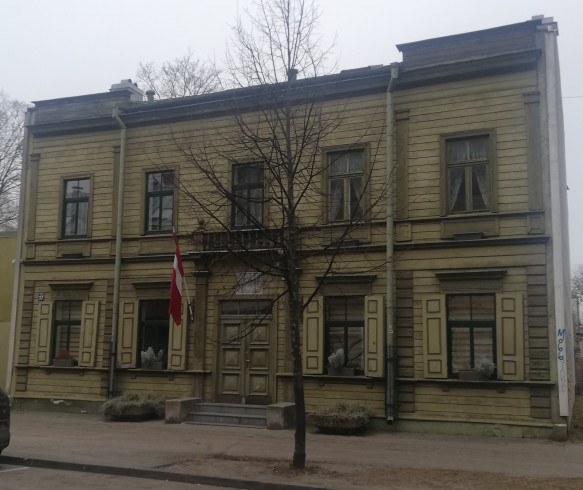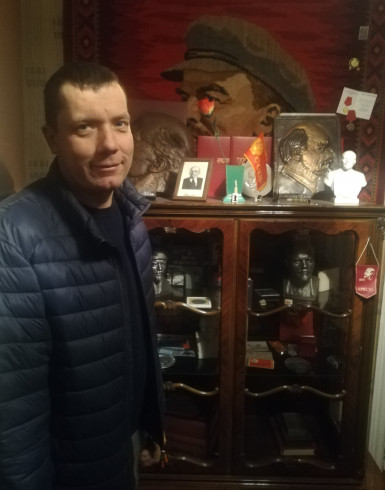Finding lingering Soviet symbols in Latvian public spaces is a game for historical sleuths. Riga’s Academy of Science (aka “Stalin’s birthday cake”) has some hammers and sickles immovably carved into its stone façade. The Lenin who once loomed over Alūksne sits in the woods at the former nuclear missile base at Zeltiņi, while his Riga counterpart gathers moss in the yard of a suburban apartment building. But save for some pre-loved Hero Worker medals at the capital’s Latgalīte flea market, that’s about it.
However, inside a modest timber house on Cēsu iela in central Rīga, icons of the former regime are not only preserved – they’re multiplying. Over a century ago, Vladimir Lenin stayed there for a single night. During the Soviet occupation of Latvia, it was turned into a shrine to the founder of the communist state.
Today, in a bizarre twist, the property is a capitalistic hotel, but one which keeps the flame of the old Bolshevik flickering.
“It’s got absolutely nothing to do with my political beliefs,” says Adris Švagalis, proprietor of “Ļeņina apartamenti”. “But as the owner of a building connected with a famous personality, I feel a duty to highlight this.”
Reds in the beds
On 5 April 1900, a then-obscure Russian named Vladimir Ulyanov made a trip to Rīga. Officially banned from entering the city, the visit was a secretive affair, but it is known that he met some fellow revolutionaries at Cēsu iela 17 and discussed plans to launch an underground newspaper.
Although this was but a tiny footnote in the man’s rise to infamy, the leadership of the Latvian SSR milked it for propaganda purposes. In 1961, a museum was installed in the room where the saint of the godless regime had rested. Rīga residents of a certain age recall being marched there to pay homage after being sworn in as Young Pioneers.
In 1991, Latvia regained its independence, and the ideological compass shifted 180 degrees. A children’s library took over the property, then in 2004 it was acquired by young entrepreneur Andris. Comparing the furniture and wallpaper in the hallowed space with old magazine pictures, he realised it hadn’t succumbed to the tide of “euro renovation” blandness and spotted an opportunity.
The first floor houses the office of his small construction, property management and hotel enterprise (he has another guesthouse in Riga’s Āgenskalns suburb.) The second-floor hosts family-friendly accommodation with all mod cons. In the attic, he has resurrected the Lenin room, and is gradually filling it with the richest collection of Lenin memorabilia this side of a Moscow mausoleum.

Andris enthusiastically shows off his treasures. A porcelain bust of Lenin from a German factory which a few years earlier had been cranking out likenesses of Hitler, and a rare aluminium model with the leader in a fur cap. Some volumes from the first Russian edition of the collected works. A collection of pins bequeathed by an elderly gentleman with 6,000 unique items, waiting for a rainy weekend to be arranged for display.
“I feel positive about it all,” he says. “It’s my hobby, and I love finding new things, so friends and guests regularly give me stuff for free or sell it for a reasonable price."
The “Lenin was here” sign out the front was removed after 1991, but Andris has made a copy from vintage photographs. Although there are a few grumbles of disapproval from passers-by, he says the branding draws more guests than it drives away.
And a small number of Bolshies are still drawn by the goateed-one’s aura. Andris has uncovered and reinstalled a bronze Lenin bust on a two-metre-high concrete pedestal, which had been hastily buried in the garden in 1991. On three key dates – 7 November (Revolution Day), 21 April (Lenin’s birthday) and 11 January (the anniversary of his death) – a handful of nostalgic Soviets ask to come in and lay flowers. Gracious host that he is, Andris is happy to oblige.
Konsjeržs.
Posted by Ļeņina apartamenti on Wednesday, 23 January 2019
This feature was originally published on the website of the Latvian Institute and is reproduced here with permission.






























